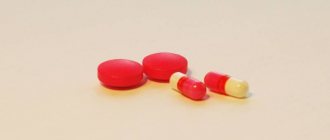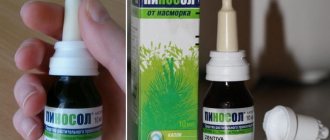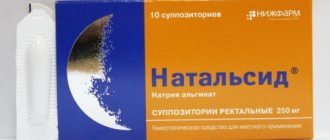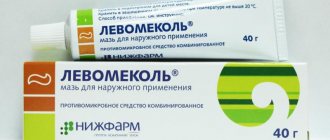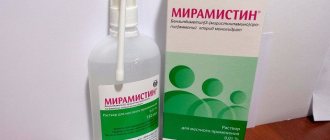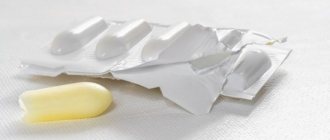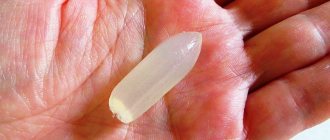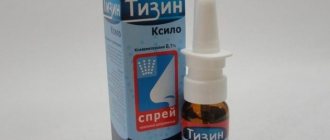Suppositories for hemorrhoids during pregnancy are the most effective way to get rid of the external manifestations of this disease. Their effectiveness is determined by the fact that they have a local effect, are hypoallergenic and, in most cases, consist of plant components.
- Suppositories in the first trimester
- Rectal suppositories in the second trimester
- Candles in the third trimester of pregnancy
As you know, the period of bearing a child is one of the main reasons for the development of internal hemorrhoids, which is caused by the active growth of the fetus and an increase in the volume of the uterus. Such factors lead to displacement of internal organs, as a result of which the rectum is compressed. It follows that the disease often develops in the second half of pregnancy, but an exacerbation of the chronic form of the disease may occur at an earlier stage.
In addition, hemorrhoids during pregnancy are caused by changes in hormonal levels, poor nutrition, a sedentary lifestyle and the influence of stressful situations.
There are no special contraindications to the use of suppositories; the only one may be individual intolerance to one or another component of the medicine.
Types and causes of hemorrhoids
The period of bearing a child is accompanied by an increase in pressure in the abdominal cavity - the enlarged uterus acts on the plexus of veins located in the area of the anus. This may be the source of the development of this delicate problem.
Hemorrhoids are varicose veins of the rectum
Hemorrhoids are a pathology associated with the vessels of the rectum, as a result of which hemorrhoids enlarge or fall out.
The disease in question has several forms:
- Congenital.
- Acquired:
- primary, arising due to poor lifestyle, nutrition, pregnancy and childbirth;
- secondary. The causes are serious illnesses, some types of tumors that affect the blood circulation of the pelvic veins.
- External - hemorrhoids are located close to the anus.
- Internal – increase in internal nodes.
What factors can influence the occurrence of this disease? The reasons for the enlargement or prolapse of hemorrhoids are still unknown. There are some assumptions, but they have not received evidence or scientific confirmation.
External hemorrhoids - hemorrhoids are located close to the anus
According to observations, there are several causes that cause hemorrhoids:
- poor nutrition;
- pelvic tumors;
- constipation;
- inherited disease;
- pregnancy, childbirth;
- sedentary lifestyle;
- alcohol;
- excessive physical activity.
Constipation during pregnancy can lead to hemorrhoids
Is it necessary to treat the pathology?
Some women do not consider it advisable to treat hemorrhoids during pregnancy for fear of harming the baby. But in no case should treatment be postponed until the postpartum period, since this pathology:
- may worsen the well-being of the expectant mother, which can lead to poor tolerance of pregnancy, and as a result, to deviations in the development of the baby;
- characterized by the gradual development of hemorrhoids to large sizes, which provokes inflammatory processes and tissue death, and then infection of the body with various diseases that can be transmitted from mother to child;
- in an advanced stage, anemia may develop against the background of regular bleeding, and this process increases the risk of oxygen starvation for the baby;
- at the end of labor, it begins to actively develop, which leads to complications.
Therefore, it is necessary to treat hemorrhoids during pregnancy as soon as possible and preferably in the first stages; for this, there are many medications that are allowed to be used even in the first trimester. But every girl who is faced with this disease must understand that treatment must be prescribed exclusively by a doctor.
Suppositories for hemorrhoids during pregnancy
It is not easy to cure hemorrhoids during pregnancy, but it is necessary. Moreover, the doctor must not only relieve the patient of the disease, but also not cause harm to the fetus.
The reason for this is medications, many of which are prohibited for expectant mothers. However, candles will help cope with this task. They are also called rectal because the method of use is to insert them into the rectum. The natural ingredients on which suppositories are made will help relieve pain, heal anal fissures, and improve blood flow in the pelvis.
Each drug differs from each other in its individual properties and has its own advantages and disadvantages. Let's take a closer look at which suppositories for hemorrhoids can be used during pregnancy.
Sea buckthorn suppositories for hemorrhoids
Features of treatment
Treatment of hemorrhoids during pregnancy is carried out only under the supervision of a doctor. Hemorrhoids at 37 weeks of pregnancy are treated differently than in the first trimester, this is due to the effect of medications on the development of the child. The problem needs to be treated, even if hemorrhoids appear at 38 weeks of pregnancy.
To eliminate the problem, expectant mothers need to do special exercises.
The treatment regimen directly depends on the duration of pregnancy and the stage of the disease. The first manifestations of hemorrhoids can be cured by adjusting your diet. It is recommended to consume foods high in fiber, fermented milk products, avoid flour and sweets, and limit pickles and smoked foods. It is important to establish a drinking regime (6-8 glasses of water per day) and perform simple physical exercises.
In the second and third stages, they try to postpone treatment until the 3rd trimester of pregnancy in order to minimize the effect of drugs on the child. Acute hemorrhoids at 38 weeks of pregnancy cannot be removed surgically. If possible, the doctor will find safe ways to alleviate the condition of the expectant mother. As a rule, the doctor prescribes suppositories or ointment for hemorrhoids, and surgery is performed after delivery.
Suppositories for hemorrhoids during pregnancy 1st trimester
The first trimester is the most important stage. The embryo is still very small, just beginning to grow and form. It is advisable to spend this time without taking medications, because the effect of the drug may affect the child’s health. But what to do if hemorrhoids occur and treatment is required? You need to use ointments, creams or traditional methods. You can also use candles, but you should be very careful in choosing them. Let's look at a few suppositories that are allowed in the first trimester:
- Sea buckthorn candles. Sea buckthorn has long been known for its healing properties and is used in medicine to treat various diseases. Based on it, suppositories do not have a negative effect on the health of the expectant mother or the fetus, therefore they are prescribed even from the first trimester of pregnancy. The drug helps heal the affected areas and eliminates unpleasant symptoms. Sea buckthorn oil, dissolving in the body, effectively fights the disease, improves the immune system and disinfects the mucous membrane. Along with many advantages, these suppositories have one drawback: they are contraindicated for use if the patient has diarrhea or is intolerant to the ingredients of this drug.
- Natalsid. Homeopathic preparation based on brown algae. It is completely safe, so it can be used at all stages of pregnancy. It has antiseptic and anti-inflammatory properties, heals wounds, eliminates itching, burning and pain. It has no side effects, only a certain percentage of women experience allergic reactions.
Folk remedies for hemorrhoids during pregnancy
The use of folk remedies during pregnancy in the 3rd trimester comes down mainly to the use of sitz baths with herbal decoctions. The most popular and effective are baths with a decoction of chamomile and sage flowers. Baths with a decoction of birch leaves and string are also very effective. You should take such mini-baths after each bowel movement. They have a hemostatic effect, help disinfect mucous membranes, and also relieve inflammation and pain.
To improve the protective functions of a pregnant woman and the body’s resistance to infections, you should take viburnum or carrot decoction and drink rowan juice. Include more fresh vegetables and fruits in your diet.
During pregnancy, a woman should pay special attention to her health, as she is especially susceptible to various diseases. It is necessary to provide the expectant mother with a complete and balanced diet, maintain physical activity and take walks in the fresh air more often.
Suppositories for hemorrhoids during pregnancy 2nd trimester
The main reason for the appearance of hemorrhoids in the 2nd trimester is frequent constipation. They arise due to difficulties during defecation, which causes the veins to dilate and hemorrhoids to form. Also, one of the reasons may be injury to the mucous membrane due to irregular bowel movements.
Suppositories that can be used in the treatment of hemorrhoids in the 2nd trimester:
- Neo-anuzol. The composition of suppositories contains active components that help achieve a rapid therapeutic effect, and they are also distinguished by anti-inflammatory, bactericidal, astringent and antiseptic characteristics. The drug is prescribed for the treatment of various forms of hemorrhoids, anal fissures, inflammatory processes, as well as the prevention of the disease. This medicine has one contraindication – sensitivity to the ingredients.
- Hepatrombin. Thanks to its potent substances, the drug is used for almost all forms of hemorrhoids. These suppositories are strictly contraindicated in the first trimester due to their adverse effects on the development of the child. In the second and third trimesters, Gepatrombin is used only under the supervision of the attending physician.
Causes of pathology in pregnant women
The fetus, which develops in the uterus, gradually gains weight. The greater the weight of the fetus, the greater the pressure it puts on the intestines and pelvic organs. Blood in this area begins to circulate more slowly, and stagnation occurs, which is similar to varicose veins.
The soft tissues of the intestines swell, causing protrusion of the intestine, which is called hemorrhoids.
- Primary is a disease that develops as a result of fetal pressure on the intestines, and it is subject to direct treatment.
- Secondary - occurs as a symptom of more complex changes in the body, such as diseases of the cardiovascular system or liver.
The condition of the disease is aggravated if the pregnant woman leads a sedentary lifestyle in the last trimester. Chronic constipation also contributes to the occurrence of hemorrhoids, since stool moves through the intestines slowly, and this provokes inflammation.
Women who are overweight and those who are born with thin-walled blood vessels are more likely to develop this pathology.
Suppositories for hemorrhoids during pregnancy 3rd trimester
The last trimester is less dangerous for the fetus. However, significantly increased pressure on the pelvic organs provokes the development of hemorrhoids. It is necessary to remove all symptoms, as this may interfere with normal delivery.
Suppositories used to treat hemorrhoids during this period:
- Nigepan. This medicine eliminates pain, itching and burning in the anal area, and stops the inflammatory process. Restores affected tissues, stops the growth of existing ones and prevents the formation of new blood clots, reduces their size. The use of suppositories may be accompanied by the following side effects: itching, skin rash, burning and redness.
Nigepan suppositories for hemorrhoids
- Relief. Suppositories have anti-inflammatory properties and effectively heal anal fissures, relieve itching, pain and burning, and have a beneficial effect on the mucous membrane. The drug is contraindicated if the patient has blood pressure, diabetes mellitus, and allergic reactions with swelling and itching in the rectum are possible.
- Proctosan. These suppositories quickly eliminate bleeding, swelling, heal cracks and wounds in the anal area, have an anti-inflammatory effect, prevent blood clots and help restore the mucous membrane. The drug may cause allergic reactions: redness, swelling, and sometimes burning.
Rectal suppositories
Rectal suppositories are the main and safest means for treating hemorrhoids in expectant mothers. This is due, first of all, to their local action. Suppositories act exclusively on the painful area of the anus, while their main substances do not enter the bloodstream and do not spread to the main organs, which means the risk of harm to the fetus is minimal.
Among the most popular and safe suppositories it is worth highlighting:
- Relief;
- Anuzol;
- Sea buckthorn candles;
- Procto-Glyvenol;
- Ichthyol candles;
- Propolis.
It is best to give preference to suppositories made from natural ingredients. Thus, taking such medications will be safe not only for the woman, but also for the child.
Relief
One of the popular anti-hemorrhoids is in the form of suppositories, available in several forms (Relief Ultra, Relief Advance, Relief Pro), the main active ingredient in the composition is: shark liver oil extract, phenylephrine, methyl parahydroxybenzoate. Among the auxiliary components of candles, it is worth highlighting wax, starch and cocoa butter. It has a pronounced anti-inflammatory, antioxidant, analgesic and hemostatic effect, helps to moisturize and soften the affected tissues. Promotes their speedy recovery.
- Indications: internal and external hemorrhoidal disease, cracks and ulcers on the walls of the anus, anal pain and itching.
- Contraindications: sensitivity to the composition, blood granulocytopenia, tendency to form blood clots.
- Undesirable manifestations: hyperemia of the dermis, skin dermatitis and rash, itching in the anus.
- Directions for use: recommended dosage – 3-4 suppositories during the day, the course of treatment is individual.
Anuzol
Combined preventive medicinal product with local action, the main active ingredients are: xeroform, belladonna extract, glycerin, zinc sulfate. The drug is effective in the treatment of stage 1 and 2 hemorrhoidal disease in pregnant women; it quickly relieves pain, eliminates irritation, tones and strengthens veins, and increases the body's resistance to disease.
- Indications: hemorrhoids of external and internal form, ulcers and cracks on the walls of the colon, damage and erosion of the anus.
- Contraindications: glaucoma, tumors of various types, prostatitis, defect of urine outflow, taken with extreme caution during pregnancy.
- Undesirable manifestations: constipation, diarrhea, excessive dry mouth, dizziness, migraine, lethargy and drowsiness, allergies.
- Directions for use: apply one suppository 2-3 times during the day, the duration of treatment is purely individual.
Candles with sea buckthorn oil
A natural and completely harmless medicine in the form of suppositories, made on the basis of a single component: oil extract of sea buckthorn berries. The additional components are: wax, water, solid fat. The action of the product is to restore the microflora of the colon, eliminate inflammatory and infectious phenomena, heal and regenerate damaged tissues of the anal area.
- Indications: hemorrhoids, chronic pathologies of the colon, colitis, proctitis.
- Contraindications: hypersensitivity to the composition, diarrhea, inflammation of the pancreas, bile stones.
- Undesirable manifestations: allergic manifestations in the form of burning and itching of the anus.
- Directions for use: use 1 suppository once a day, preferably at night, the course of treatment lasts from 7 to 10 days.
Procto-Glyvenol
A combined drug with local action, it belongs to the category of anesthetics and venotonics, the main active ingredients are: tribenoside, lidocaine. Due to the active substances, the drug has a polyvalent effect; it not only relieves pain, but also heals wounds, restores cracked areas of tissue, disinfects, relieves swelling and inflammation.
- Indications: stage 1-2 hemorrhoidal disease of internal and external type, erosion of the walls of the colon, inflammation of the anus.
- Contraindications: individual sensitivity, patient age under 18 years, first trimester of pregnancy.
- Undesirable manifestations: allergic manifestations in the form of rash and burning.
- Directions for use: it is recommended to use 1 suppository twice a day, the course of treatment is determined by the proctologist.
Ichthyol candles
A drug of local influence, which is considered completely natural and harmless, the main active ingredient in the composition is ichthyol or ichthammol. The additional components for forming suppositories are: water, emulsifier, solid fat, supposir. This remedy is one of the few medications for hemorrhoids that have virtually no contraindications. Therefore, the use of such suppositories is indicated at different ages and forms of the disease.
- Indications: prostatitis, hemorrhoidal disease, salpingoophoritis, endometritis.
- Contraindications: age under 18 years, individual sensitivity or allergy to ichthyol.
- Undesirable manifestations: in rare cases, an allergic rash is possible.
- Directions for use: apply one suppository twice a day, the duration of therapy is fixed by the attending proctologist.
Propolis extract
Another natural medicine indicated for use in the 3rd trimester of pregnancy, the main active ingredient in the composition is natural propolis. The auxiliary components are: tannins, vitamins, resin, wax, oils and esters, flavonoids, organic and other acids. These suppositories have a lot of positive properties and, in comparison with other similar drugs, have a complex effect not only on the pelvic organs, but also on the entire body.
- Indications: respiratory tract diseases, stage 1-2 hemorrhoidal disease, prostatitis, arthritis, chronic bronchitis.
- Contraindications: hypersensitivity to the main component.
- Undesirable manifestations: allergic rash, itching, pain in the anus.
- Directions for use: use 1 suppository three times a day, the duration of treatment varies depending on the complexity of the disease - from 10 to 30 days.
The most effective suppositories
Most medications contain potent ingredients, so they are contraindicated for use during pregnancy, which complicates the process of treating hemorrhoids. The following candles can be distinguished, which will quickly and effectively heal the symptoms of the disease, and at the same time will be safe for the unborn child:
- Relief;
- Neo-Anuzol;
Relief suppositories for the treatment of hemorrhoids
- Posterisan;
- Betiol;
- Nigepan;
- Suppositories with heparin;
- Sea buckthorn candles;
- Proctosan;
- Proctosedyl.
It is necessary to completely cure the disease with stronger drugs after the birth of the child.
Prevention
Preventing the development of hemorrhoids is much easier than trying to eliminate its symptoms later.
- First, change your diet. Exclude baked goods, flour products, fried foods and fast food from it. Give preference to plant foods rich in fiber, dairy products, nuts and fish.
- Wash yourself after each visit to the toilet, do not sit on the toilet with a book or smartphone - this puts unnecessary stress on the intestines.
- Move as much as possible. This way you will improve the health of your entire body, get rid of excess weight if you have it, and ensure constant blood circulation in your tissues.
- Give preference to loose clothing. Clothing that tightens the body impedes blood flow and causes congestion.
Hemorrhoids are a disease that occurs as a result of poor diet, sedentary lifestyle, and genetic predisposition. It is necessary to consult a doctor for diagnosis and appropriate treatment of this pathology.
A healthy lifestyle and proper nutrition will contribute to a speedy recovery or have a preventive effect.
Pregnancy Diseases by trimester Diseases in the 3rd trimester Gastrointestinal diseases during pregnancy
Prices for rectal suppositories
The price of rectal suppositories for hemorrhoids depends on the number of suppositories in the package, the pharmacy network, as well as other factors. Here is the average price for some drugs:
- Sea buckthorn candles – from 350 rubles;
- Natalsid - from 370 rubles;
- Ichthyol candles - from 60 rubles;
- Propolis DN - from 250 rubles;
- Neo-anuzole – from 60 rubles;
- Hepatrombin G – from 170 rubles;
- Procto-Glyvenol - from 350 rubles;
- Relief - from 350 rubles;
- Proctosan - from 320 rubles;
- Nigepan - from 200 rub.
Problems such as hemorrhoids often occur in women during pregnancy. If you notice the slightest symptoms, you should not hesitate to consult a doctor, who will prescribe effective treatment and appropriate medications. Rectal suppositories will provide a positive result, but they should be used only as recommended by a specialist, even if the instructions do not indicate any complications, side effects or contraindications. Only a specialist will determine the advisability of using a particular drug, taking into account all the possible consequences for the mother and child.
How to treat hemorrhoids in the 3rd trimester
In order to get rid of an unpleasant pathology, a pregnant woman must adhere to a set of rules, which include drug treatment, proper nutrition and self-care.
Proper nutrition
The diet for this disease should be aimed at thinning the stool. Preference is also given to products that strengthen blood vessels and have an enveloping effect on the intestinal mucosa.
Recommended products include dried fruits, nuts, boiled fish and poultry, local fruits, buckwheat and pearl barley, honey, leafy vegetables, boiled root vegetables, and herbs. Fermented milk drinks - kefir, yogurt without additives, yogurt - will be very useful.
Soups should be prepared using weak poultry broths, olive and flaxseed oil, natural juices without preservatives and glucose syrup should be consumed.
Foods prohibited during a therapeutic diet include those that contribute to excess gas formation - legumes, black bread, white cabbage, cucumbers. It is prohibited to cook fried foods or eat animal fats.
It is necessary to exclude drinks such as tea, coffee, alcohol, milk from the diet, and stop eating baked goods, pasta, mushrooms and canned food.
Important! If you don't have access to still mineral water, shake your sparkling water bottle a few times to release the gas before drinking.
Mineral waters have a healing effect on the intestines, so if you have hemorrhoids, you need to ensure their regular use. In this case, give preference to still water, since carbon dioxide has an irritating effect on the inflamed intestinal mucosa.
Hygiene and toilet
Since during pregnancy there is a weakening of the innervation of the intestines, make a toilet schedule and stick to it with minor deviations. Delayed bowel movements aggravate the course of the disease.
If bowel movement does not occur, leave the toilet and try again later - straining the intestines in vain will lead to worsening symptoms. Sit straight on the toilet, place your feet on the floor, spread your knees wide.
If you need to relieve yourself in a public toilet, use a paper toilet cover and never attempt to relieve yourself while squatting. Tighten your intestines and lower abdomen, not your abdominal muscles.
To wipe, use wet toilet wipes or very soft paper, and be sure to wash yourself after each bowel movement. This will prevent the development of foreign microflora and the appearance of diaper rash. Wash with cool water and cream soap that does not leave any residue on the skin.
Pharmacy drugs
Treatment with medications can be local and general. In the case of a pregnant woman, preference is given to the local one, since the effect on the fetus in this case will be minimal.
Did you know? Proctology as a separate branch of medicine arose in the 17th century and began to develop rapidly. Initially, gentle methods were used to treat hemorrhoids, which included the use of herbal ointments, physical exercise and treatment with leeches. Only in 1930, after much research and experimentation, American proctologists Morgan and Milligan invented a surgical method for removing hemorrhoids, which is used unchanged in our time.
Most often used for this purpose:
- Ointments. The list of ointments approved for pregnant women includes Vishnevsky ointment, calendula cream, Ichthyol, Fleming ointment, Proctosan and Relief. Heparin, Hepatrombin and Levomekol can only be used after consulting a doctor.
- Candles. The following suppositories for hemorrhoids are natural and do not harm either the mother’s body or the fetus: Relief, sea buckthorn suppositories, Ichthyol, Natalsid. Papaverine is recommended to be used only as prescribed by a doctor.
- Pills. They are prescribed less frequently than local medications, as they have a general effect and can affect the fetus. Their action is aimed simultaneously at strengthening blood vessels, liquefying stool and relieving inflammation. The following drugs are used only on the recommendation of a doctor: Olfen, Detralex, Troxevasin, Nise, Glivenol, Aescusan.
Folk remedies
Sitz baths are considered the most reliable and safe folk remedy for hemorrhoids.
They are made from warm decoctions:
- chamomile;
- burdock;
- St. John's wort;
- weak solution of potassium permanganate.
You should prepare a bath with a temperature of no higher than 20 ° C from clean boiled water, spread your buttocks and sit in the broth for five to seven minutes. There is no need to wash yourself after the procedure; it will be enough to blot your skin with a clean cotton (non-terry) towel.
Candles cut from potatoes are widely used in folk healing. Large potatoes are peeled, washed thoroughly and a candle is cut out of it, similar in size and shape to a medical candle. This suppository must be inserted into the anus in the evening before bed. The course of treatment lasts until symptoms are completely eliminated.
Another remedy that effectively fights hemorrhoids is sea buckthorn oil. Compresses are made from it by soaking gauze fabric folded five to seven times. Compresses are applied for thirty to forty minutes, then the remaining oil on the skin is gently rubbed into it.
A mixture of sea buckthorn oil and buckwheat honey is also used to treat hemorrhoids. The ingredients are mixed in a 3:1 ratio, respectively, and applied to the problem area for fifteen minutes. Rinse off the mixture with cool water, directing the shower jets from bottom to top onto the anal area.
Physical activity
Moderate physical activity will accelerate blood circulation in the pelvic area, eliminate congestion and strengthen the walls of blood vessels. They will also have a beneficial effect on the body as a whole.
Daily exercise in the pool, yoga and aerobics for pregnant women, and race walking are recommended. Each activity has exercises designed specifically for pregnant women. You can learn these exercises by visiting a professional instructor or by watching video tutorials on YouTube.
Important! Before signing up for classes at the pool, check whether it is mandatory to submit a medical certificate confirming the absence of infectious diseases. If the pool management is indifferent to this issue, consider doing yoga or aerobics, and do not put your health at risk.
Homemade antihemorrhoidal ointments for pregnant women
Among pregnant women, there is a category of women who are afraid of any pharmacology during gestation. They perceive each pill as a terrible threat, as a “chemical” that harms a growing baby. Simply put, some expectant mothers seriously exaggerate the issue of medication treatment during pregnancy. Indeed, during these 9 months you should not take medicine without indications and a balanced attitude to the issue. But if there is a need for treatment, you just need to ask a specialist what kind of ointment for hemorrhoids can be used during pregnancy.
Expectant mothers who categorically reject pharmaceutical drugs seek to be treated with folk, homemade remedies. But this is also a dangerous story: not all plants can be useful for pregnant women. And even if you decide to make the ointment yourself according to a folk recipe, you also need to agree with your doctor.
What ointments are conditionally allowed for pregnant women:
- Based on calendula. This remedy resists inflammation and the action of bacteria, promotes rapid healing of wounds. To prepare this composition, you need to mix 6 parts of butter with 1 part of calendula tincture. The cooled composition heals inflamed nodules.
- Herbal. In equal parts, take crushed powder of oak bark, St. John's wort, as well as knotweed and toadflax. This vegetable raw material should be added to the interior fat; it is melted in a convenient way. After a couple of hours, the composition is ready for action.
- Ointment with propolis. Propolis is also a natural stimulator of tissue regeneration and helps relieve swelling. Crushed propolis should be mixed with vegetable oil in a ratio of one to ten. It also needs to be dissolved. The mixture is applied to the affected area.
- Onion ointment. Boil a fresh onion with olive oil. Then take it out, add propolis and potato pulp to the broth. Mix, cool and you can start treatment.
Traditional recipes will not be as effective as classical medicines. No matter how much you want it, the effectiveness of homemade ointments is still lower. In addition, the fact that you make them yourself leaves the possibility of errors and miscalculations in storing medicinal mixtures. It turns out that the risk for the expectant mother, one way or another, remains. Still, it is more logical to turn to traditional medicine and a competent doctor.
Summing up
Many pregnant women in the process of carrying a baby are faced with such a problem as hemorrhoids. And in this case, it is important to promptly contact a specialist who will prescribe competent and effective treatment. At any stage of pregnancy, homeopathic preparations and suppositories based on herbal components are prescribed: sea buckthorn, ichthyol, papaverine, propolis and others. Such suppositories relieve irritation, relieve constipation, relieve pain and other unpleasant symptoms.
additionally You should be wary of such drugs as Relief Advance, Posterizan Forte, Anuzol, Betiol and Olestezin. These products contain active ingredients that can negatively affect the development of the fetus. Drugs can be prescribed, but only in particularly severe cases, and only by the attending physician.

